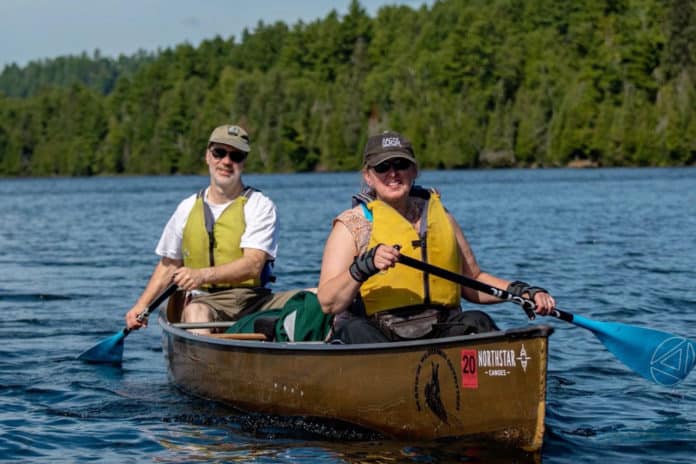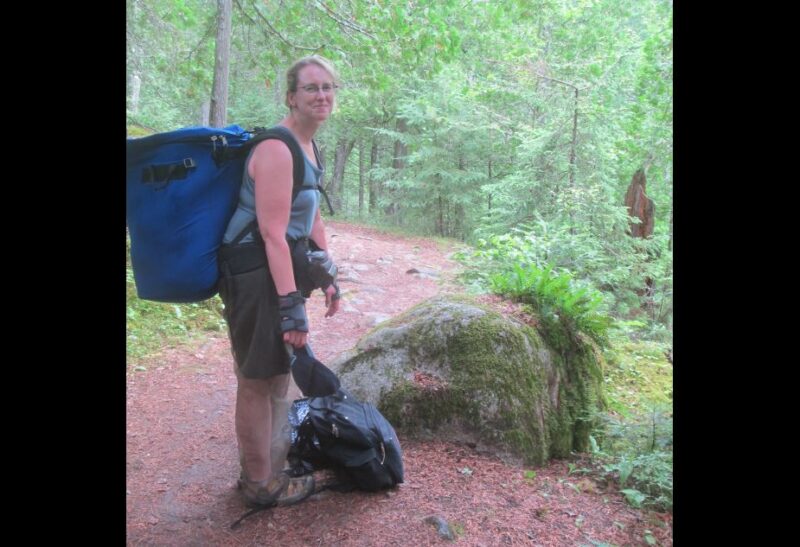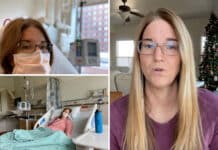
Kate Zerby was always on the go, hiking, camping, canoeing — until the COVID-19 vaccine slowed her down two years ago and continues to impact her lifestyle.
Zerby, who was a lifelong Democrat and now describes herself as “politically homeless,” sat down with Liz Collin to discuss her frustrating journey to find answers.
Zerby received the Moderna shot in February 2021.
“Gladly and very willingly did I go, because I wanted to do what was best for the community and for myself. I wanted to travel,” she said.
Right away, she became very sick. She had a fever, head pressure and headaches, dizziness, swelling of her arm, and back pain.
“I just felt really, really ill, and it took me days to get over that. It seemed like a very strong initial reaction, and so I was a little worried about the second shot,” Zerby said.
She also experienced a “foreboding, doom feeling” in the middle of the night after receiving her first shot. She later learned from doctors that feeling is common for people before having a stroke or a heart attack.
She turned to her general practitioner, who sent her to two different allergists, both of whom couldn’t give her a solid answer. No one could tell her whether she should get the second dose.
The day of her appointment for the second shot, she was very dizzy and prayed about whether to go. She had a strong feeling that she should not get the second dose, even though she felt “terrible” about it.
Her doctor advised her to call the CDC for guidance, and then the CDC told her to go to her general practitioner. She did not end up getting the second shot.
Zerby had heart tests completed in the past and had been told by doctors that her heart was “perfect.” After continually experiencing dizziness, headaches, and tinnitus after the vaccine, she went in again for heart tests.

Doctors found her in constant atrial fibrillation with heart enlargement.
Her symptoms today are better but have not gone away completely. Zerby has spent $20,000 out of pocket trying to find answers.
She was able to go on her annual Boundary Waters trip last summer, although it did set her back “about three weeks,” she explained.
“For three weeks I could barely walk or lift my legs out of the car.”
“I’m definitely doing better. I used to have palpitations several times a day, and I’m not having that … I’m back to doing a lot of things that I did before,” she said, even though she is still in pain at times. She takes blood thinners and still has some issues with her left side and with walking.
Zerby is disappointed with the lack of help she and others have gotten from the Democratic Party. She believed that people in leadership would want to know that some people weren’t having a great reaction to the vaccine.
“I felt like they’d want to be aware, but there’s been nothing that I can see of any interest.”
She has met people who are vaccine-injured like her and attended a rally in Washington, D.C. to try to gain traction for this group.
“There’s always going to be outliers,” she said. “We’re trying to get traction and assistance for some of these people who’ve had reactions.”
Her biggest concern with vaccine mandates is the lack of follow-through on research. Since VAERS isn’t always reliable, she is concerned about injury tracking.
She reported her own injuries to VAERS, and two doctors have also made reports specifically on her heart’s reaction to the vaccine.
She tries to encourage others in similar positions to hers and give hope.
“I want everybody to be okay … so I don’t give up easily,” Zerby said.
She advised other vaccine-injured people to join MN Team Humanity and receive support from a like-minded group.
LISTEN:










